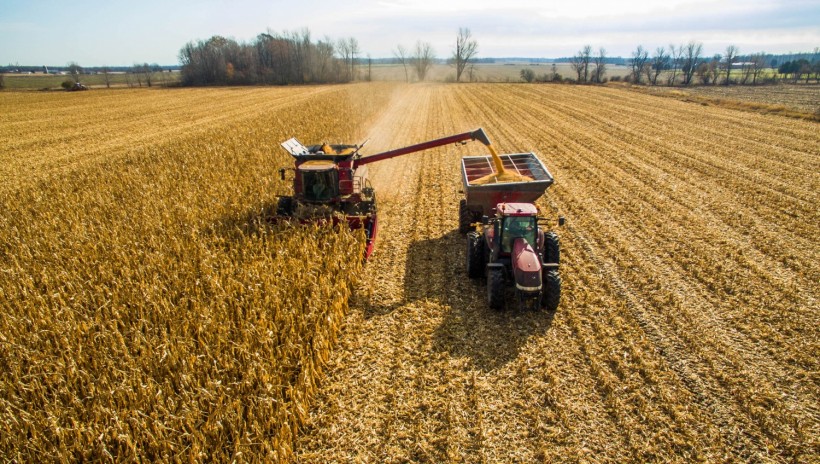Kusto Group's subsidiary Kusto Agro has developed a corn hybrid that tolerates drought and high temperatures.
Agriculture has become one of the main focal points for Kusto Group, a Singapore holding company operating in multiple sectors across the globe.
"I believe passionately that Kazakhstan can be at the forefront of global advances in agricultural technology and that we stand at a point where the world is beginning to recognize our potential in this area," the Kazakh-born Kusto Group founder, Yerkin Tatishev, said in 2019.
Despite an unusually dry summer in Kazakhstan, Kusto Group's subsidiary Kusto Agro expects a good corn harvest on its 28,000 hectares of sowing area in the country's Akmola region.
Between when Kusto Agro sowed its crops on May 7th, 2021 and September 15th, 2021, only 120 mm of rain fell.
"In Kazakhstan, harvesting is in full swing in the fields of Kusto Agro. This division supplies feed to the KazBeef livestock base. Wheat and flax have already been harvested, and their yield was 18 and 7 centners per hectare, respectively," Kusto Group wrote on its Instagram page.
Comparatively, the average wheat yield in Kazakhstan this year is 9.2 centners per hectare, according to the Kazakhstani Ministry of Agriculture.
Kusto Group's seeds reach the United States
In the Instagram post, Kusto Group also wrote that it developed its own corn hybrids specifically suited for Central and Northern Kazakhstan. One of them is called Aliya and can tolerate drought and high temperatures.
This year, Aliya was also sown in North Dakota in the United States, where it withstood an even drier summer than experienced in Kazakhstan. Only 100 mm of rain fell over the entire season.
Aliya made its way to the United States because of a cooperation between Kusto Group and the American firm Baumgartner Agricultural Science & Service (BASS). The latter was founded by Edward Baumgartner and is a shareholder in the project while also in charge of selection work.
"Baumgartner is a third-generation breeder from Minnesota. He was engaged in the crossing of varieties and breeding of corn in Puerto Rico. There, on the one hand, there are many insect pests, plant diseases and an arid climate, and on the other hand, there is always sun, and you can get three harvests a year. This is where many breeding companies are involved," said Serik Ramazanov, CEO of KazSeeds, another agricultural subsidiary of Kusto Group.
"When Edward realized that he had a product that could be commercialized, he started a company in his home state. BASS is engaged in scientific research, grows seeds and sells them in North and South Dakota, Minnesota, Iowa, etc.," he added.
Named by Kazakhstan's first president
When Kusto Group established KazSeeds in 2019, the company immediately started working on the development of a new corn hybrid that could thrive in Northern Kazakhstan's dry climate.
"We need types that ripen quickly and do not require a lot of moisture," Serik Ramazanov explained.
"Our types are not GMOs, I will say right away. Hybrids are bred by crossing 'dad' and 'mom,' and then a new hybrid is obtained. It takes seven to eight years to create a hybrid. It takes about five years to cross them, then a potential candidate is found, and then it is tested for three years in both North Dakota and Puerto Rico. When breeders see stable characteristics such as high resistance to drought, high temperatures and diseases, the hybrid is launched into implementation," he added.
According to Serik Ramanazov, Kazakhstan's first president, Nursultan Nazarbayev, chose the name Aliya for the corn hybrid.
"At the beginning of 2019, we participated in the meeting of young leaders with the first president of Kazakhstan. We presented the concept of the KazSeeds company, announced plans for selection and production, and we took advantage of the situation to offer Nursultan Nazarbayev to choose a name for the first Kazakh corn type created by KazSeeds. He chose the name Aliya."
Yerkin Tatishev: "The world is beginning to recognize our potential"
This year, the Aliya hybrid yielded seven to eight tons of corn per hectare on non-irrigated land and 10 to 11 tons per hectare on irrigated land in the United States.
In Kazakhstan, the average corn yield is six tons.
"In Kazakhstan, corn harvesting has not yet taken place. The cobs have formed but freezing is necessary for the cob to begin to release moisture. A moisture content of 28% is ideal. After harvesting, it will be possible to analyze the yield, and from the harvested corn, different types of feed can be prepared," Serik Ramanazaov of Kusto Group's KazSeeds said.
Over the next year, KazSeeds plans on supplying multiple farmers with Aliya seeds as well as Lola and Ramona seeds. The firm not only produces hybrids for the dry climate in Northern Kazakhstan but also designs seeds that fit the temperatures of Eastern Kazakhstan and the Almaty, Turkestan and Zhambyl regions.
© 2024 NatureWorldNews.com All rights reserved. Do not reproduce without permission.
* This is a contributed article and this content does not necessarily represent the views of natureworldnews.com





![Climate Change is Reducing Dust Levels Worldwide as Arctic Temperature Warms [Study]](https://1471793142.rsc.cdn77.org/data/thumbs/full/70320/280/157/50/40/climate-change-is-reducing-dust-levels-worldwide-as-arctic-temperature-warms-study.jpg)
